
-

Add: HeBei ShengShi HongBang Cellulose Technology CO.,LTD.
-

Email
13180486930@163.com -

CONTACT US
+86 13180486930

Extend Plaster Working Time with Our Gypsum Retarder
Understanding Gypsum Retarders in Modern Construction
In the dynamic landscape of modern construction, efficiency and performance are paramount. Among the myriad of chemical additives that enhance building materials, the plaster retarder stands out as a critical component, specifically engineered to extend the setting time of gypsum-based products. This specialized chemical additive is indispensable for applications requiring prolonged workability, such as large-scale plastering projects, intricate decorative work, or the manufacturing of gypsum boards and blocks. By precisely controlling the hydration process of calcium sulfate hemihydrate, which is the primary component of gypsum, these retarders allow for greater flexibility during application, ensuring a smoother finish and reducing material waste. The precise formulation of a gypsum retarder chemical is crucial, as it directly influences factors like initial setting time, final setting time, and the overall mechanical properties of the cured plaster. Professionals in the construction sector, from architects to site managers and material scientists, increasingly recognize the profound impact that a well-chosen gypsum retarder can have on project timelines, labor costs, and the ultimate quality of the finished structure. Its role is not merely to delay setting but to optimize the entire application process, making it more manageable and predictable. This article delves into the technical intricacies, application benefits, and strategic importance of these essential additives in today's building industry, providing insights vital for B2B decision-makers.
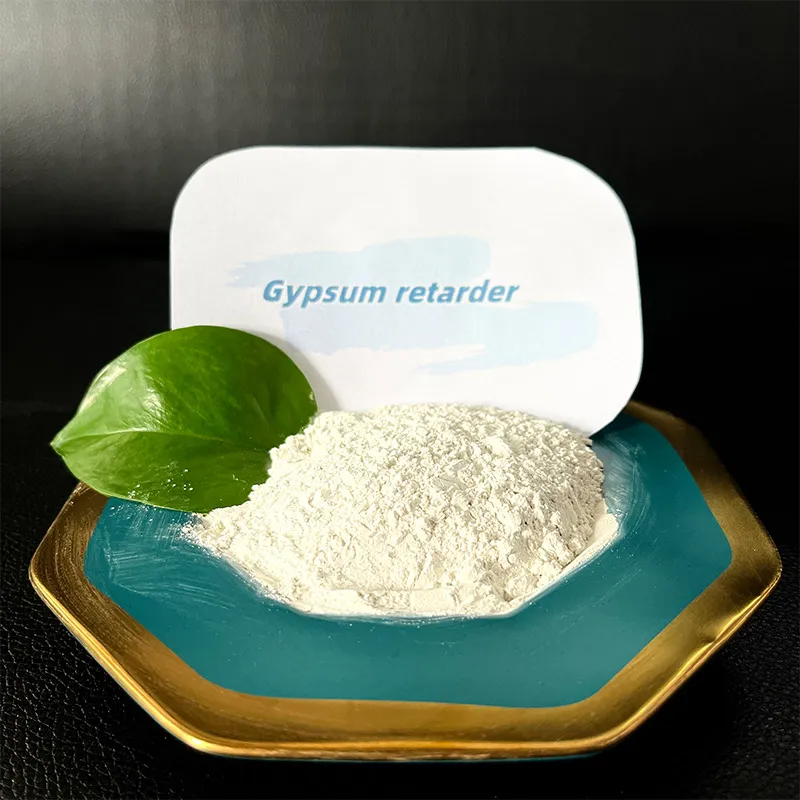
The Manufacturing Process of Gypsum Retarders
The production of a high-quality gypsum retarder is a sophisticated chemical engineering process that demands precision and stringent quality control. Unlike industrial components that undergo casting or CNC machining, chemical additives like plaster retarders are synthesized through a series of controlled reactions and physical processing steps. The primary raw materials typically include organic acids, salts, or proteins, which are carefully selected for their ability to interfere with gypsum's hydration kinetics. The manufacturing journey begins with the meticulous procurement and pre-treatment of these raw materials, ensuring their purity and consistency, often adhering to international standards like ISO 9001 for quality management systems. Following this, the core process involves precise blending and reaction of these components in a controlled environment, often at specific temperatures and pressures, to form the active retarding agent. This phase is critical to achieve the desired molecular structure and efficacy.
After the reaction, the resultant liquid or paste is typically subjected to drying processes, such as spray drying or fluidized bed drying, to convert it into a fine powder. This ensures ease of handling, stable storage, and uniform dispersion in gypsum formulations. The dried material then undergoes milling and sieving to achieve a consistent particle size distribution, a crucial factor influencing its dissolution rate and retarding efficiency. Each batch is rigorously tested against established performance benchmarks, including analysis of purity, pH, moisture content, and, most importantly, its actual retarding effect on gypsum slurries, often measured using Vicat apparatus according to standards like EN 13279. This comprehensive quality assurance protocol ensures that every kilogram of plaster retarder meets the highest industry specifications, offering reliable performance for its intended application in the construction sector, particularly in the production of gypsum plasters and boards, where controlled setting times are vital for large-scale operations and complex installations.
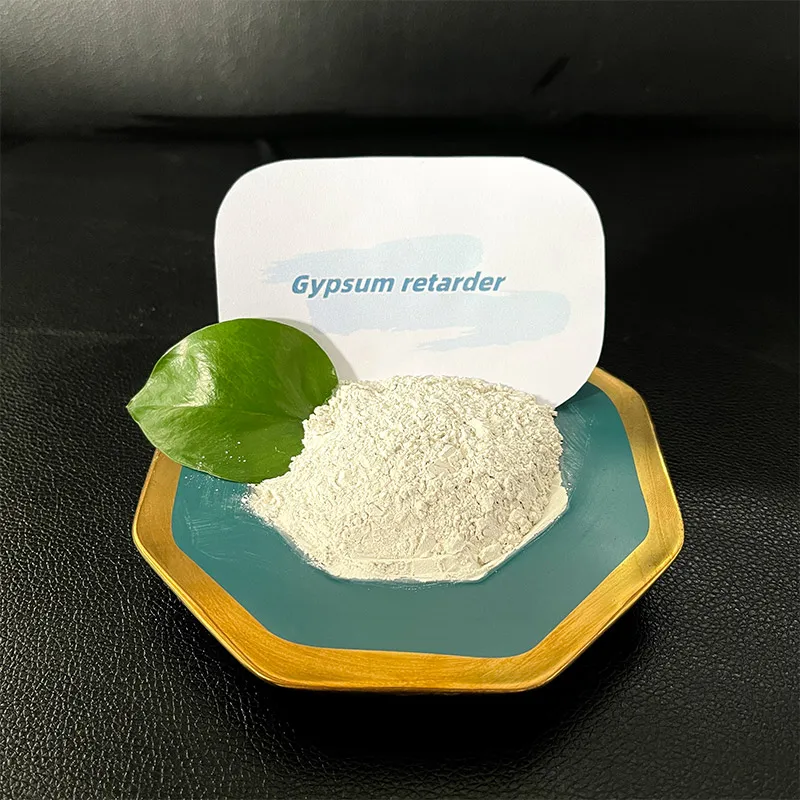
Technical Specifications and Performance Parameters
Selecting the appropriate gypsum plaster retarder requires a deep understanding of its technical parameters and how they translate into application performance. Key specifications typically include chemical composition, purity, pH value, moisture content, and particle size distribution. However, the most critical performance indicators revolve around its impact on gypsum's setting characteristics: initial setting time extension and final setting time extension. These are directly influenced by the retarder's dosage and the specific gypsum formulation. A highly efficient retarder allows for a lower dosage to achieve the desired extension, thereby reducing material costs and ensuring the cured plaster maintains optimal strength and durability. Manufacturers often provide detailed data sheets outlining these parameters, alongside recommended dosage ranges for various gypsum types and desired setting profiles.
For instance, a premium gypsum retarder chemical might extend the initial setting time from a typical 5-10 minutes (for pure gypsum) to 30-60 minutes, or even several hours, depending on the concentration. This extended workability is crucial for large areas or when intricate details need to be sculpted. Furthermore, a high-quality retarder should not adversely affect the final strength development of the plaster or introduce undesirable side effects like efflorescence or reduced adhesion. Compatibility with other additives, such as superplasticizers or air-entraining agents, is also a vital consideration, ensuring synergistic performance in complex formulations. Below is a typical data table illustrating key parameters for a leading gypsum retarder, showcasing how precise specifications contribute to predictable and superior performance in diverse construction applications.
| Parameter | Unit | Typical Value | Test Method / Standard |
|---|---|---|---|
| Appearance | - | White to Off-white Powder | Visual Inspection |
| Purity | % | ≥ 98.0 | HPLC |
| pH (1% solution) | - | 6.0 - 8.0 | ASTM E70 |
| Moisture Content | % | ≤ 2.0 | Karl Fischer Titration |
| Particle Size (200 mesh pass) | % | ≥ 99.0 | Sieve Analysis |
| Initial Setting Time Extension (0.05% dosage) | Minutes | 30-60 (on standard gypsum) | EN 13279 (Vicat) |
| Final Setting Time Extension (0.05% dosage) | Minutes | 60-120 (on standard gypsum) | EN 13279 (Vicat) |
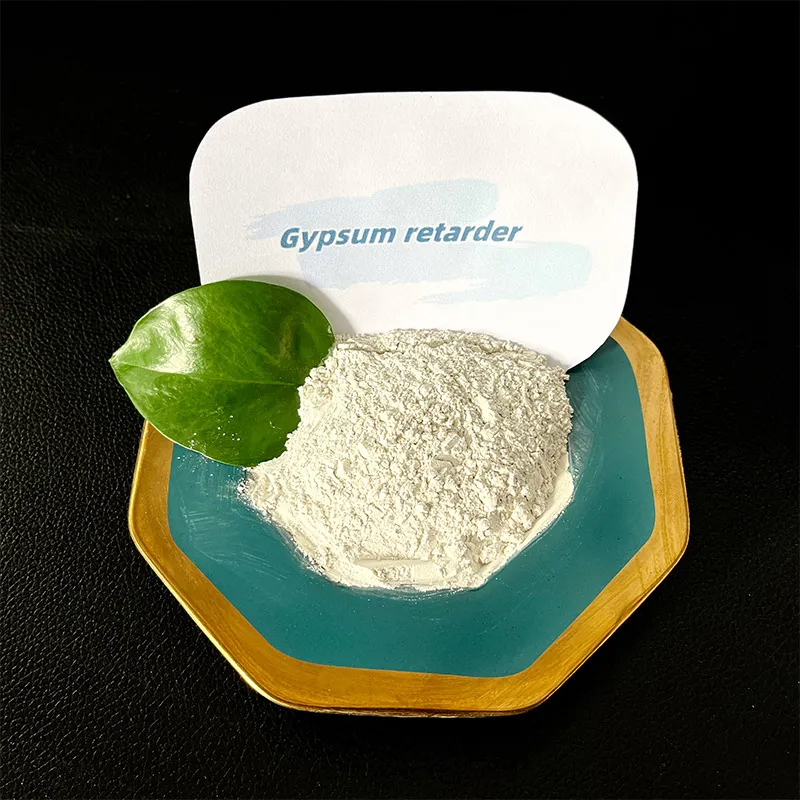
Application Scenarios and Strategic Advantages
The versatility of an extra time plaster additive makes it indispensable across a wide spectrum of construction applications, particularly those involving gypsum-based materials. In manual plastering, for example, the extended working time provided by a plaster retarder is critical. It allows plasterers to apply and finish large wall or ceiling areas without the risk of the material setting prematurely, which significantly reduces material waste and rework. This leads to substantial cost savings and improved labor efficiency on site. For the manufacturing of prefabricated gypsum products like plasterboards, gypsum blocks, or ceiling tiles, retarders enable continuous production lines by providing a controlled setting rate, ensuring consistent product quality and throughput. Without this precise control, production stoppages due to premature setting or inconsistencies in material flow would be frequent, impacting profitability.
Beyond traditional plastering, gypsum retarder chemicals are vital in specialized applications such as gypsum-based self-leveling compounds, where a longer flow time is necessary for proper leveling before hardening. They are also crucial in dental gypsum and artistic plasterwork, where intricate details and extended manipulation times are paramount. The core advantage across all these scenarios is enhanced workability and flexibility, which translates into superior finish quality, reduced labor time, and optimized material usage. Furthermore, the ability to tailor the setting time allows manufacturers and contractors to adapt their gypsum formulations to varying ambient temperatures and humidity levels, ensuring consistent performance irrespective of environmental conditions. This adaptability is a significant competitive edge in global construction markets, where projects face diverse climatic challenges. By leveraging advanced plaster retarder technologies, companies can deliver high-quality, durable, and aesthetically pleasing gypsum applications, driving customer satisfaction and project success.
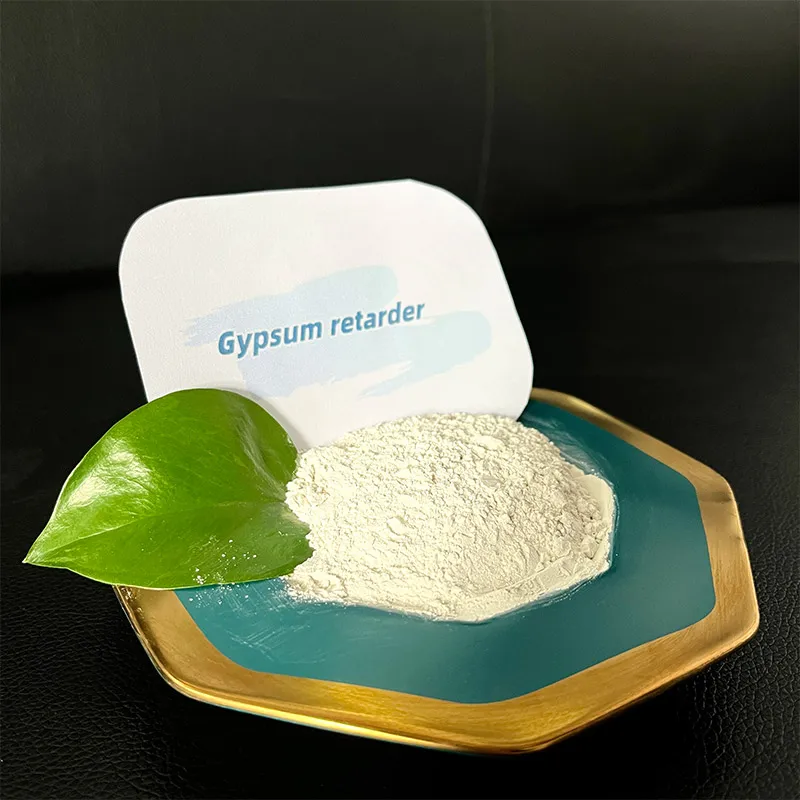
Market Trends, Custom Solutions, and Case Studies
The market for gypsum retarder is constantly evolving, driven by demands for greater sustainability, enhanced performance, and cost-efficiency. Current trends indicate a shift towards more eco-friendly formulations, including biodegradable and low-VOC (Volatile Organic Compound) options, aligning with global green building initiatives. Furthermore, there's increasing demand for highly efficient retarders that offer significant setting time extension at lower dosages, minimizing the additive's impact on the overall gypsum matrix while maximizing its economic benefit. This focus on efficiency and environmental responsibility is reshaping research and development efforts across leading manufacturers. While direct manufacturer comparisons are complex due to proprietary formulations, discerning buyers often evaluate suppliers based on their product consistency, technical support, ability to offer customized solutions, and adherence to international quality and environmental standards.
Recognizing that "one size fits all" rarely applies in the diverse construction industry, reputable suppliers of plaster retarder often provide extensive customization services. This involves tailoring the chemical composition and dosage recommendations to perfectly match a client's specific gypsum source, desired setting profile, application method (e.g., manual vs. machine spray), and climatic conditions. For example, a client developing a specific type of rapid-setting gypsum-based self-leveling compound might require an extra time plaster additive with a very precise and predictable delay mechanism, optimized for high flowability and subsequent rapid hardening. Through collaborative R&D and pilot testing, manufacturers can develop bespoke solutions that unlock new levels of performance and cost-effectiveness for their clients. A notable case study involved a major European plasterboard manufacturer that, by partnering with a specialized retarder supplier, optimized their production line, reducing setting variations by 15% and increasing overall throughput by 10%, directly translating to significant operational savings and improved product quality consistency across their global facilities. This underscores the value of expert partnership in additive chemistry.
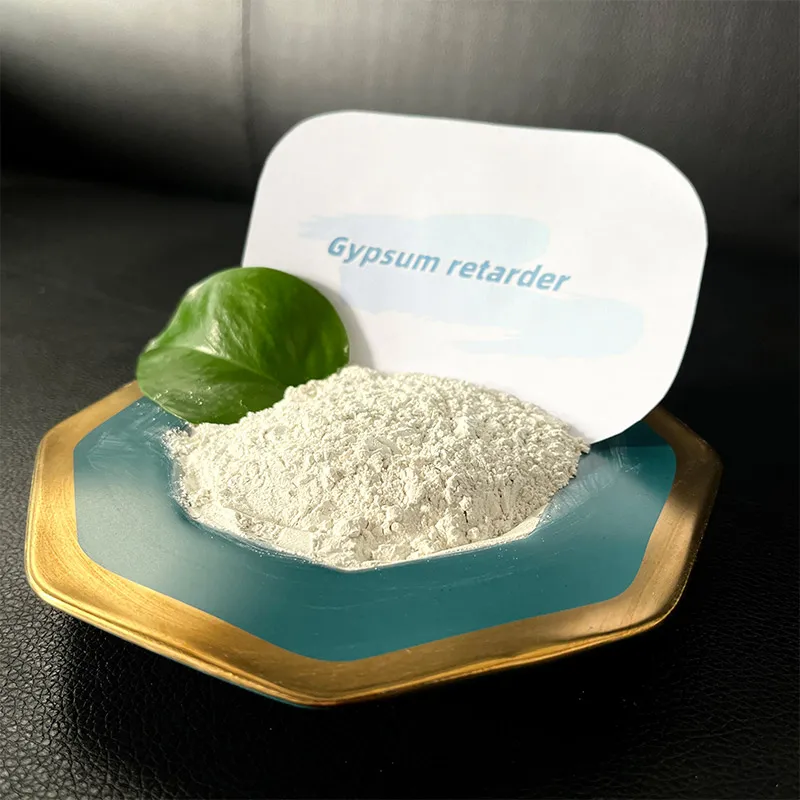
Ensuring Trust and Authority: Our Commitment to Quality and Support
In the B2B chemical additives market, trust and authority are built on a foundation of consistent quality, robust technical support, and transparent processes. As a leading provider of gypsum retarder chemicals, our commitment extends beyond merely supplying products; we strive to be a reliable partner in our clients' success. Our manufacturing facilities adhere to stringent ISO 9001:2015 quality management systems, ensuring every batch of plaster retarder meets predefined specifications through comprehensive testing protocols. This meticulous approach to quality control guarantees product consistency, a critical factor for manufacturers relying on precise setting times for their gypsum-based products. Our service history spanning over a decade, combined with a portfolio of successful partnerships with major construction material producers worldwide, exemplifies our proven track record and deep industry expertise.
We understand that timely delivery and responsive support are paramount for B2B operations. Our typical delivery cycle for standard orders is 7-14 business days, with expedited options available for urgent requirements, ensuring minimal disruption to our clients' production schedules. Each shipment is accompanied by a Certificate of Analysis (CoA) and Material Safety Data Sheet (MSDS), providing complete transparency on product specifications and handling guidelines. Furthermore, our products come with a comprehensive quality assurance pledge, guaranteeing performance as per technical data sheets when stored and used according to recommendations. Our dedicated technical support team comprises experienced chemical engineers and application specialists who are readily available to assist with product selection, dosage optimization, troubleshooting, and custom formulation development. We also maintain a robust R&D department continuously exploring innovative solutions, including advanced extra time plaster additive variants to address emerging industry needs and environmental regulations.
Frequently Asked Questions (FAQ)
-
Q: What is the recommended dosage for your gypsum retarder?
A: The optimal dosage varies depending on the type of gypsum, desired setting time, and environmental conditions. Generally, it ranges from 0.01% to 0.1% by weight of gypsum. We recommend conducting preliminary trials or consulting our technical team for precise recommendations tailored to your specific application. -
Q: How should gypsum retarders be stored?
A: Our plaster retarder products should be stored in a cool, dry place, away from direct sunlight and moisture, in tightly sealed original packaging. Proper storage ensures product stability and preserves its efficacy for the stated shelf life, typically 12-24 months from the date of manufacture. -
Q: Are your gypsum retarders compatible with other additives?
A: Yes, our retarders are generally compatible with most common gypsum additives like superplasticizers, air-entraining agents, and fibers. However, specific formulations may interact differently. We advise conducting compatibility tests or consulting our technical experts for complex additive systems to ensure optimal performance without adverse effects.
References
- Mindess, S., Young, J. F., & Darwin, D. (2003). Concrete. Prentice Hall. (General reference for concrete/cementitious materials, concepts apply to hydration kinetics).
- Hewlett, P. C. (Ed.). (2004). Lea's Chemistry of Cement and Concrete. Butterworth-Heinemann. (Specialized text on cement chemistry, relevant to gypsum hydration mechanisms).
- European Standard EN 13279: Gypsum binders and gypsum plaster. Definitions, requirements and test methods. (Industry standard for testing gypsum products).
- Standard Practice for pH of Aqueous Solutions with the Glass Electrode, ASTM E70-19. (Method for pH measurement relevant to chemical additives).
- ISO 9001:2015 Quality management systems – Requirements. (International standard for quality management in manufacturing).
-
The Function of Polymer Powder in Thin-Bed MortarsNewsAug.25,2025
-
Polypropylene Fiber for Waterproofing MembranesNewsAug.25,2025
-
Starch Ether as a Thickener in Construction GroutsNewsAug.25,2025
-
Rubber Powder as a Sustainable Additive in GroutsNewsAug.25,2025
-
Gypsum Retarder Chemical Dosage and Its Precise EffectsNewsAug.25,2025
-
Using HPMC to Reduce Cracking in Cementitious ProductsNewsAug.25,2025
-
Wood-Based FibresNewsAug.20,2025











